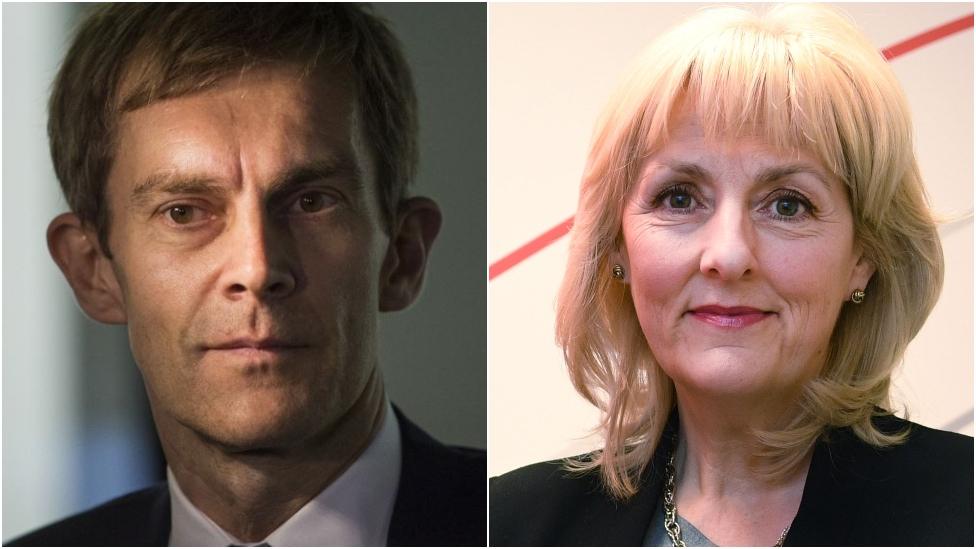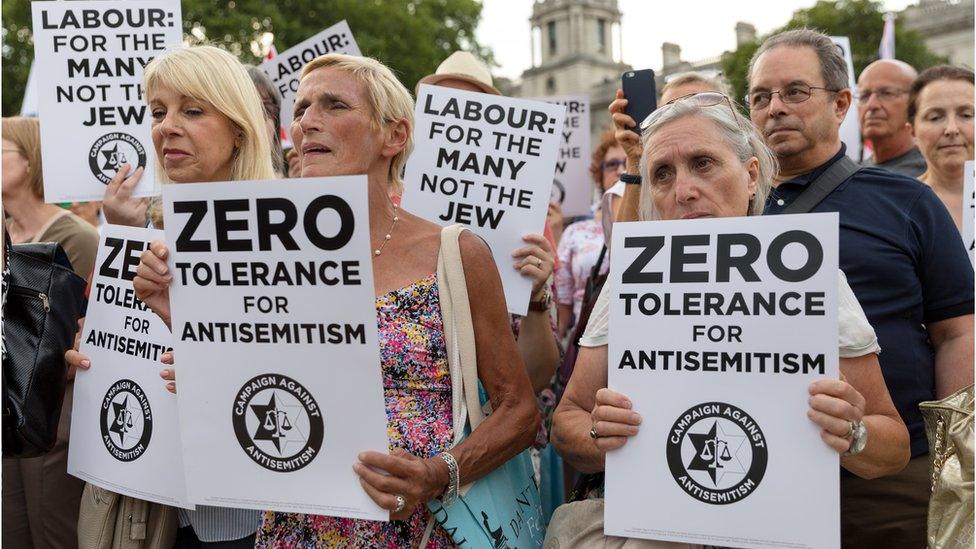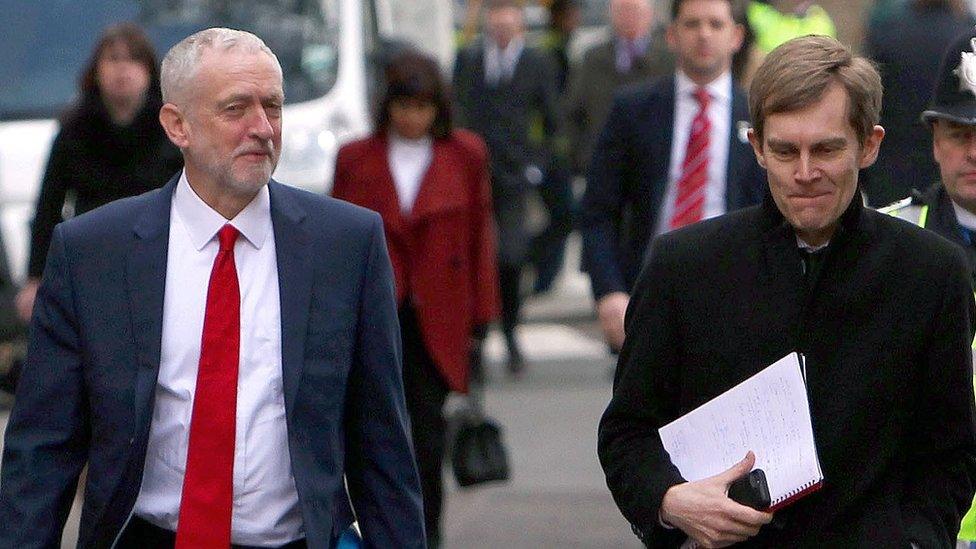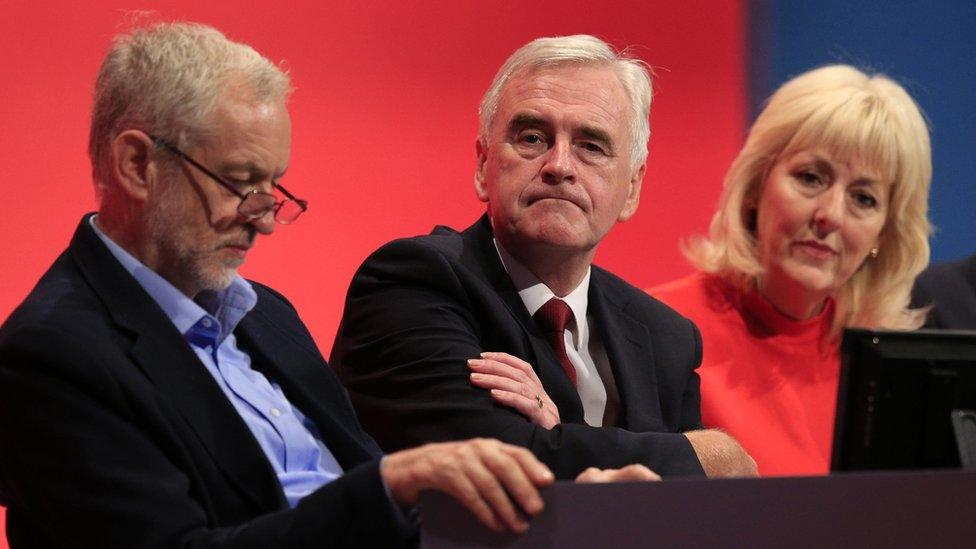Top Labour figures 'interfered' in anti-Semitism disputes
- Published

Seumas Milne and Jennie Formby have been accused of interfering in the disciplinary process
Senior Labour figures have interfered in the disciplinary process of dealing with accusations of anti-Semitism, ex-party officials have told the BBC's Panorama.
Seumas Milne, one of Jeremy Corbyn's closest aides, told officials the party was "muddling up political disputes with racism" and must review processes.
And General Secretary Jennie Formby attempted to interfere in who sat on a panel examining a high-profile case.
Labour said there was no interference.
Instead, it said the former staff making the claims were "disaffected".
But the party's deputy leader Tom Watson said he was "shocked, chilled and appalled" by the allegations and the party had "serious questions" to answer.
And other MPs commended the courage of those who had spoken out, Ruth Smeeth describing their testimony as "heartbreaking".
'Instruction'
Labour's disputes team is supposed to operate independently from the party's political structures, including the leader's office.
But Sam Matthews, the party's former head of disputes, said he interpreted an email sent by Mr Milne - the Labour leader's communications chief - in March 2018, calling for a review into how complaints were handled, as "an instruction".
Mr Matthews is one of eight former Labour officials - seven of whom worked in the party's Complaints and Disputes Department - who have spoken to Panorama about their experiences of dealing with anti-Semitism cases.
They claim:
The leader's office was "angry and obstructive" when it came to the issue
Officials brought in by Ms Formby "overruled" disciplinary decisions and "downgraded" punishments to a "slap on the wrist"
Mr Milne laughed when advised by a long-serving party official about what Mr Corbyn should do to tackle anti-Semitism in the party
On one occasion, Jeremy Corbyn's office ordered batches of anti-Semitism complaints to be brought to his Commons office for processing by his aides
Four chose to talk publicly despite having signed non-disclosure agreements (NDAs) with Labour not to discuss any aspects of their work for the party.
Louise Withers Green, a former disputes officer, left the Labour Party after being signed off with depression and anxiety.
She had signed an NDA so she did not have to work her notice period, but despite that spoke to the programme, saying she wouldn't "be able to live with myself unless I speak up about the horrendous things that I know have been happening".
The party has been engulfed by a long-running dispute over anti-Semitism within its ranks, which has led nine MPs and three peers to leave the party.
The leadership has been accused of failing to get to grips with the problem, with allegations of hundreds of complaints against members remaining unresolved.
BBC Panorama spoke to more than 20 former officials as part of its investigation - Is Labour Anti-Semitic? - which will be broadcast at 21.00 BST on Wednesday.
They allege that they had to deal with a huge increase in anti-Semitism complaints since Mr Corbyn became leader in 2015.
Panorama discovered there was backlog of 1,000 anti-Semitism allegations this spring, with only 15 people having been expelled.
Asked about that relatively small number, Andrew Gwynne, shadow communities secretary, said there were "lots of cases that are ongoing as well" and some people, when faced with an investigation, had chosen to leave of their own accord.
"We are serious about getting shot of this problem," he insisted.
A Labour spokesman told the BBC the 1,000 figure was "categorically untrue".


The testimony Panorama reveals tonight - and the leaked emails they have obtained - will paint a picture that contrasts with the leadership's claims that they are doing as much as they can.
And they will cause deep alarm in many parts of the Labour movement.
For their part, Mr Corbyn's allies totally reject the testimony that's been put forward - instead claiming those who have come forward are "disaffected".
But this is a real challenge to Mr Corbyn's handing of anti-Semitism.

'Bad publicity'
Mike Creighton, Labour's former head of the disputes team, told BBC Panorama he was approached by Mr Milne for advice in spring 2016.
He said he had suggested the party dealt with some of the top level anti-Semitic cases "much more swiftly and much more robustly", and that Mr Corbyn make a speech on the Middle East, "particularly saying that Israel had a right to exist".
But Mr Creighton claimed Mr Milne's response was to laugh at him.
"I thought he actually wanted to know how we tackle anti-Semitism within the Labour Party," he added. "I think what he actually meant to say was, how do we deal with the bad publicity we're getting?"
When Panorama put this allegation to the Labour Party, they said: "The Labour Party dispute this conversation ever took place… this allegation is false and malicious.
"Jeremy Corbyn has repeatedly expressed his support for Israel's right to exist and for a two state solution... so there is no reason whatsoever to laugh at any such suggestion."
Jewish Labour Party members told the BBC’s Panorama about their experiences of anti-Semitism in the party
Officials said they received an email from Mr Milne in March 2018, in which he said "something's going wrong and we're muddling up political disputes with racism".
"I think going forward we need to review where and how we're drawing the line."
Mr Matthews, who left his role after two years in 2018, said he interpreted the email as "the leader's office requesting to be involved directly in the disciplinary process".
He added: "This is not a helpful suggestion. It is an instruction."
Officials also told the programme Mr Corbyn's office had on one occasion ordered batches of anti-Semitism complaints to be brought to them to assess.
But Labour said this was a "staff resourcing matter", and it was not unusual for people to be seconded into the party's governance and legal unit - so separation was maintained.
The party said in a statement: "The Leader's Office did not intervene. These former disaffected employees sought the view of staff in the Leader's Office, which was compiled with in good faith.
"These disaffected former officials include those who have always opposed Jeremy Corbyn's leadership, worked to actively undermine it, and have both personal and political axes to grind."

Labour Party members have been protesting over its handling of anti-Semitism allegations
When it came to Ms Formby, a leaked email chain appears to show an attempt to influence the selection of the disciplinary panel for the case of Jackie Walker - the former vice chair of the Left-wing Labour campaign group Momentum, who was expelled in March over allegations of anti-Semitism.
An email written by Ms Formby on 5 May 2018, said: "The National Constitutional Committee cannot be allowed to continue in the way that they are at the moment and I will also be challenging the panel for the Jackie Walker case."
Later in the chain, Ms Formby wrote that she had "deleted all trace of the email", adding: "Too many eyes still on my Labour [email] address."
The email chain was copied to Mr Milne, Karie Murphy - Mr Corbyn's chief of staff - and Mr Corbyn's personal email address.
'Held accountable'
Ms Formby's predecessor as general secretary, Lord McNicol, said the emails should set "alarm bells ringing across the party".
"The NCC was created in a specific way to remove itself from politics and from political interference. So to try to interfere politically within the NCC is just wrong."
The Labour Party told Panorama that Ms Formby temporarily stopped using her party email because of concerns a political opponent had access to it.
They said that "the emails… are simply about ensuring the NCC is held accountable for the length of time they take to hear cases, and about protecting the party against any successful legal challenge on the basis of perceived bias if the same panel is used in high profile cases".
A spokesman added: "Labour is taking decisive action against anti-Semitism, doubling the number of staff dedicated to dealing with complaints and cases. And since Jennie Formby became general secretary, the rate at which anti-Semitism cases have been dealt with has increased four-fold."
'Vile views'
Kat Buckingham, who was the former chief investigator on the disputes team, told Panorama she had a breakdown and decided to leave the party as a result.
"I was stuck between…an angry and obstructive Leader's Office and an arcane disciplinary system," she said. "I couldn't hold the tide and I felt so powerless and I felt guilty and I felt like I failed."
Former Labour cabinet minister Lord Falconer told BBC Radio 4's PM the allegations were "hair-raising" and showed the party was "still in denial" over the issue.
Ex-foreign secretary Jack Straw said the fact people with "vile views" had been allowed to remain in the party showed the extent of Mr Corbyn's "complacency".
He said he deplored what he called "the clique" around Mr Corbyn attempting to "rubbish" those who had given years of loyal service to the party.

Who are Seumas Milne and Jennie Formby?

Seumas Milne (r) works for Jeremy Corbyn as his communications director
Seumas Milne is Jeremy Corbyn's communications chief and at the heart of his inner circle.
He is in charge of how the party gets its message across, and its relationship with the media.
But his history lies in newspapers, having worked on the Guardian for over 30 years before taking up the role in Mr Corbyn's office.
He is considered to be on the left of the party and worked for a magazine produced by the Communist Party of Great Britain (although he was never a member).
He also wrote a book called The Enemy Within: The Secret War Against the Miners about the strikes in the mid-1980s.
Jennie Formby is the general secretary of Labour - the most senior employee in the party.
She is responsible for around 200 staff and has a number of tasks to perform, including running the party's internal committees, organising the party conference and preparing campaigns.
Her role is separate from the Leader's Office and focuses on the membership.
Before taking the post in 2018, Ms Formby worked as a trade unionist, working her way from branch secretary of the Transport and General Workers' Union to the regional secretary of Unite for south-east England.
She joined Labour's National Executive Committee - the party's governing body - in 2011.

Jennie Formby sits with Jeremy Corbyn and John McDonnell at party conference
